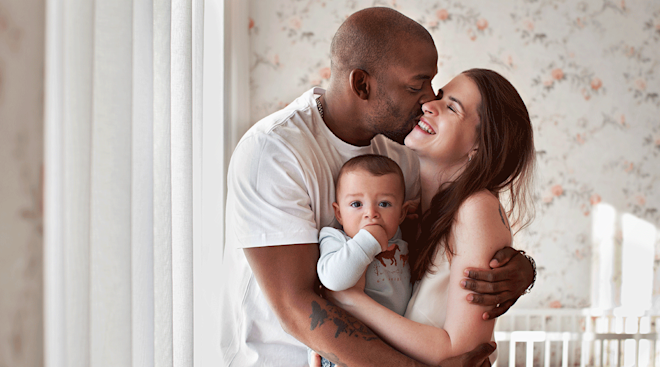Impostor Syndrome in Parents: Why It Happens and How to Overcome It
Becoming a parent is a life-altering experience. It calls for learning new skills and navigating uncharted territory, and it doesn’t come with a manual. No wonder, then, that parenthood can leave you doubting your own capabilities and stressing over failure. This is known as impostor syndrome (also known as the impostor phenomenon). Here, we spoke to experts to understand what impostor syndrome is, why it happens, how it affects parents and what they can do to overcome it.
Impostor syndrome is when you doubt your abilities and feel like a fraud or an impostor, and worry that someone will find you out. It affects not only how you think about yourself, but also how you believe you’re perceived by others. Essentially, it’s “insecurity at its worst,” says Emily Pardy, LMFT, PMH-C, founder of Ready Nest Counseling in Nashville, Tennessee. “It’s that sinking internal feeling…that you’ve actually been faking your abilities, that you’ve kept everyone believing you’re something you’re really not and your self-doubt is about to implode in on you.”
It’s important to note that while the experience is commonly termed “impostor syndrome,” it’s not an actual medical diagnosis. Impostor syndrome was coined in the 1970s by Pauline Rose Clance, PhD, ABBP, and Suzanne Imes, PhD, both board-certified psychologists based in Atlanta. While impostor syndrome was initially thought to predominantly affect women, research has since found it affects men as well. In fact, a 2011 study found that impostor phenomenon affects approximately 70 percent of people at some point in their lives. Plus, a 2013 study and 2020 review found that minorities and people of color are more often adversely affected, due to the stress of having a “minority status.”
The causes of impostor syndrome are largely rooted in childhood. In their initial study, Clance and Imes noted that impostor syndrome stems from early family experiences with parents and caregivers—for example, if a child consistently feels the need to prove themselves to their parents, or, on the flip side, a child who’s consistently praised as perfect and consequently becomes afraid of failure.
But it’s not solely a product of someone’s upbringing: A 2020 study found that the impostor phenomenon is affected by both internal and external factors, meaning it’s shaped by social experiences as well as biology and how your mind works. Those most commonly affected by impostor syndrome are high achievers who find it difficult to accept their success, Pardy says. This is backed up by the American Psychological Association, which says impostor syndrome is directly linked with perfectionism and most often affects people who grew up in families where level of achievement was conflated with one’s value and worthiness.
Impostor syndrome often affects several areas of life—including how you perceive your ability as a parent. According to Pardy, parents who are high achievers are more vulnerable. “These types of parents are already competitive, always relying on their own skills, or the achievements of others, to set goals for themselves,” she says. “When these goals become challenging or even impossible (i.e., sleep training, feeding, developmental milestones, work-life balance), the feelings of failure begin to creep up.”
Impostor syndrome can set in as soon as baby is born, says Allison Lieberman, LMFT, PMH-C, co-founder of Rooted in Harmony Counseling. “Postpartum—going home from the hospital and not knowing what to do, going to the doctor and not knowing the answers to their questions—results in feelings of being incompetent or a failure as a parent,” she explains. This can also extend into toddlerhood, when parents face new and sometimes challenging behaviors, like tantrums, she adds.
Impostor syndrome in parenting is also largely a result of our self-expectations, Lieberman notes, and can happen when parents set lofty goals for themselves that are unrealistic. Pardy agrees, adding that comparison culture also plays a big role. “There are preconceptions and expectations going into parenthood that can’t and won’t be met,” Pardy says. “Our culture subjects parents to the ideal through social media, news and even our own friends’ and families’ unsolicited advice. Since babies are unable to give consistent feedback, our internal reward system can’t set goals that are reliably attainable.” The result? Parents can often feel like they need to do things perfectly for their child—and often end up feeling like they’re doing less than others or doing something wrong.
According to Pardy, the most common symptom of impostor syndrome is feeling unlike your usual self. Lieberman and Pardy cite the following as behavior patterns to look for:
- Irritability
- Feeling overwhelmed
- Depression and anxiety
- Low self-esteem
- Isolation and withdrawal
- Rigidity in daily routines
- Black-and-white thinking
- Catastrophic thinking
- Losing sleep
- Ruminating over mistakes
- Inability to move past unmet expectations
“When we uncover these distortions of how they should be parenting versus how they are parenting, we can begin to normalize and redefine what a ‘good parent’ actually is,” Pardy says. “Because so many parents stifle this shame, it can build up a long time before it starts to disrupt your day.”
Moreover, impostor syndrome isn’t an all or nothing thing—instead, “it ebbs and flows depending on what your expectations are of yourself and what is happening in your environment,” Lieberman explains. Which is why it’s important to spot the signs of this phenomenon and learn how to shift your mindset.
Impostor syndrome can be difficult to shake, but know there are ways to overcome it and lessen the hold it has on you. It may not be easy, but it’ll help you trust in your capabilities in the long run. Below, Pardy and Lieberman list their top ways to help parents overcome feeling like an impostor:
-
Talk about it. As scary as it can be, the most important step in overcoming impostor syndrome is to talk openly about it. Acknowledging and vocalizing the struggle normalizes it and allows parents to get support, Lieberman says. “Not everyone will have the same battles, but most people can empathize with the fear of failure and rejection,” she says. It’s also important to talk freely about the mistakes you’ve made and how you’re learning from them, Pardy adds. Accepting that you’re always trying to do your best and learning as you go helps you see that other parents are just like you and learning too.
-
Differentiate between actions, thoughts and feelings. While you might feel like you’re inadequate and failing, it doesn’t mean you actually are, Pardy stresses. To train yourself to recognize these differences, complete an achievable goal, such as taking a walk or cleaning a room. Then, reward yourself with a “truthful thought,” such as, “I made this room beautiful,” Pardy says. Eventually, you’ll begin to feel more accomplished and adequate.
-
Have realistic expectations. “If you constantly feel disappointed in yourself or what you’re accomplishing, it’s time to set different goals,” Pardy says. Focus on things that are achievable on a daily basis—and take the small wins when you get them, Pardy adds, as this helps to refocus and shift perspective. Parents always want the absolute best for their children and their families, but it’s important to meet your child where they are, Lieberman notes. “It’s a process, and there’s no way to perfect parenthood,” she says. Remember: Even though it may look like one parent has it all together from the outside, everyone is truly figuring it out along the way and doing their best.
-
Stop comparing yourself. Part of setting realistic expectations for your family is to stop comparing yourself to others. One easy way to do this is to change what you see on social media. “Filter your social media with accounts that are only uplifting, honest and encouraging,” Pardy says. “While it can be lovely to see the perfect photos of someone else’s children, we don’t get the full picture (like the 300 other photos of their toddler screaming or their child refusing to smile!).”
-
Ask for help. There is absolutely nothing wrong with delegating, outsourcing or asking for help. Remember that you’re not alone in this and can lean on your people for support, especially on the hard days, Pardy says. And if you ever find the negative self-talk getting too loud, reach out to a qualified mental health professional, Lieberman adds.
The most important aspect of overcoming impostor syndrome? Be kind to yourself! Though it affects the majority of Americans, dealing with and overcoming impostor syndrome can be difficult. Show yourself some grace, trust in your abilities as a parent and seek help when you need it. And remember to be patient with your child. Impostor syndrome begins to take root in childhood, so it’s important to be mindful of how you interact with your little ones and the expectations you place on them. “Deep breaths,” Pardy says. “If you’re doing your best, you’re doing just great.”
About the experts:
Emily Pardy, LMFT, PMH-C, is the founder and CEO of Ready Nest Counseling in Nashville, Tennessee, and is certified in perinatal mental health. She is a member of the American Association of Marriage and Family Therapists, Postpartum Support International and the American Society for Reproductive Medicine, and is a published author, speaker and educator.
Allison Lieberman, LMFT, PMH-C, is the co-founder of Rooted in Harmony Counseling and host of The New Mama Mentor podcast. She received her bachelor’s degree in psychology from California State University, Northridge, and completed her master’s degree in counseling psychology at California Lutheran University.
Plus, more from The Bump:
Navigate forward to interact with the calendar and select a date. Press the question mark key to get the keyboard shortcuts for changing dates.





















































